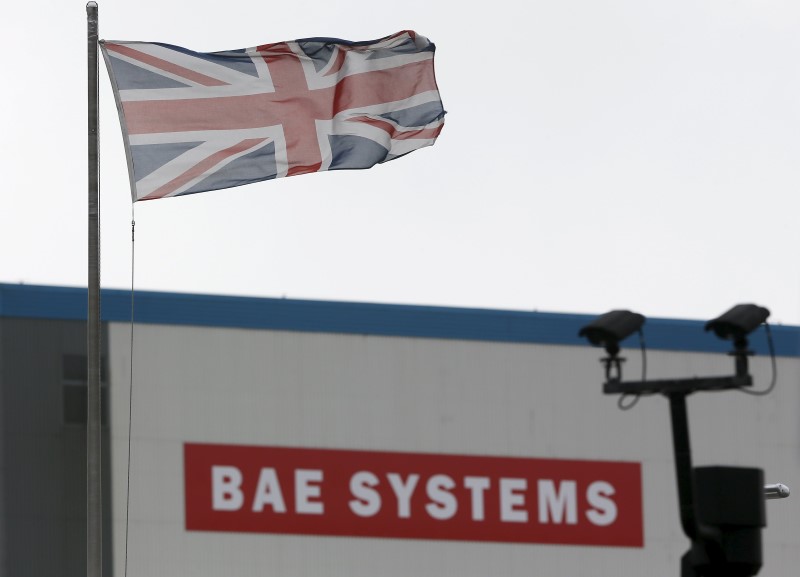By Tim Kelly and Nobuhiro Kubo
TOKYO (Reuters) - Japanese airbag component maker Daicel Corp (T:4202) and Britain's biggest defence firm BAE Systems (L:BAES) are designing an airbag for military helicopters that they hope to sell to the U.S. Army, said three sources with knowledge of the proposal.
The two companies will finalise a design in the coming months and then present a prototype to the U.S. Army, which if interested, will ask for a formal proposal, said one of the sources, who declined to be identified because he was not authorised to speak to the media.
After the U.S. Army, they would offer the airbags to the Japanese military and eventually to commercial customers, the source said.
BAE is in talks with other Japanese firms on three or four separate military-related projects, the sources added.
They declined to elaborate, but BAE's interest points to growing military industrial and security ties between Japan and the United Kingdom as Tokyo looks to broaden its alliances beyond Washington.
The airbag project also marks Daicel's first foray into foreign military markets and may be a sign that Japanese corporations are finally warming to defence-related exports.
There have been few such deals since Prime Minister Shinzo Abe ended a decades-old ban on arms exports two years ago. Experts say Japanese firms are wary of pacifist sentiments at home and unsure how to win business after decades of isolation from foreign military markets.
"Japan needs success stories" to vindicate Abe's decision, said the first source. "Airbags are an easy product to offer as a military export."
Megan Mitchell, a BAE spokeswoman, said the firm was expanding industrial partnerships to develop technologies for the Japanese and export markets, including helicopter airbag systems for military use. She gave no further details.
Daicel, which supplies Japan's army with explosives and also makes materials used in products ranging from flat panel displays to cigarette filters, declined to comment.
BAE, a longstanding supplier of military equipment to the U.S. Army, has already made cockpit airbag systems (CABS) designed to cushion helicopter pilots from the impact of a crash the same way airbags deploy during car accidents. It says these can reduce casualties by as much as 30 percent.
It fitted U.S. Army helicopters including Blackhawk troop carriers with airbags more than a decade ago before the project was wound down.
INDUSTRIAL ADVICE
Since its defeat in World War Two, Japan's security has been guaranteed by Washington and its military industries revived and nurtured by U.S. defence companies such as Lockheed Martin Corp (N:LMT), Raytheon Co (N:RTN), Boeing Co (N:BA) and Northrop Grumman Corp (N:NOC).
As Abe, with U.S.-backing, abandons that post-war status quo in favour of a broader regional security role and overseas alliances, non-U.S. arms manufacturers such as BAE are seeking out industrial ties that will add Japanese technology to their global supply chains, the sources said.
BAE is offering industrial advice to Mitsubishi Heavy Industries (T:7011), Japan's biggest defence contractor, as it tries to win a $35 billion deal to build a fleet of stealth submarines for Australia, the sources added.
A BAE spokeswoman told Reuters last June the company had also discussed the possibility of being a partner with Mitsubishi Heavy on the body design of a new amphibious assault vehicle that the maker of Japan's main battle tank is developing. MILITARY TIES
Complementing growing industrial ties is a deepening strategic partnership between Tokyo and London.
In 2012, the two countries agreed to cooperate in developing defence equipment, the first such collaboration for Tokyo beyond the United States since World War Two. Subsequent accords established regular high-level talks and created a framework for sharing defence technology.
Last month, Britain's Defence Secretary Michael Fallon and Foreign Secretary Richard Hammond visited Japan for talks with their Japanese counterparts, agreeing to quickly conclude an agreement to share ammunition, fuel and other supplies for joint military operations.
Britain also said it would dispatch Typhoon jet fighters, built by a European consortium that is 33 percent owned by BAE, to Japan this year to train with Japan's air force.
For Britain, strategic ties with Japan is one half of a two-pronged bid for deeper engagement with Asia. The overtures to Tokyo come amid closer economic cooperation with China. For Japan, Britain is a door to closer ties with Europe and NATO.
While in Japan, Fallon and Hammond went to the Yokosuka naval base, headquarters of the U.S. Seventh Fleet.

Moored at a nearby seaside park is the battleship Mikasa, which helped spearhead Japan's defeat of Russia in the 1904-05 Russo-Japanese War. It was built at a U.K shipyard now owned by BAE.